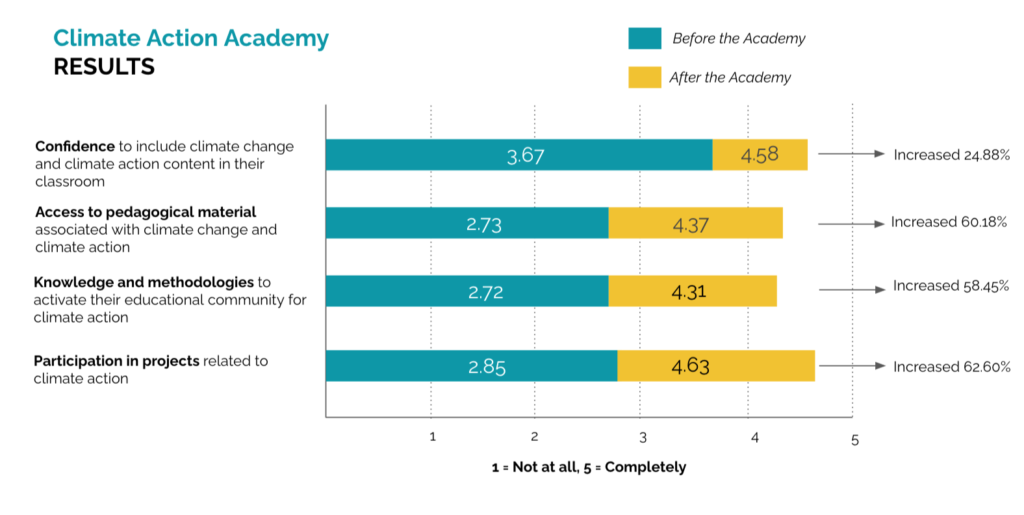Our communities continue to have their health, security and well-being threatened by the climate emergency. Yet, few are equipped with the knowledge and strategies to voice their concerns and mitigate the damage. In fact, while 86% of teachers in the U.S. agree climate change should be taught in school, the majority (55%) of teachers do not cover climate change in their classrooms or even address the subject with their students. Our work takes on this gap by mobilizing youth and educators to find holistic solutions to the climate crisis.
We believe in education as the principle means for building a sustainable world and bridging social gaps. Climate education is a proven tool for systems change that can help us reach our climate targets in the following ways:
Students develop a strong personal connection to the environment, which can have consequential impacts on their behaviors and decision-making, reducing their overall lifetime carbon footprint.
Providing space for youth and adults to think creatively about implementing sustainability initiatives in their schools, neighborhoods and communities. They can apply this creativity in a wider context when they are active members of society.
School systems are the perfect size for scaling climate action – meaningful solutions are community-driven and rooted in local challenges.
Only 2 countries (Italy and New Zealand) have fully integrated climate change into their national curricula, but reforming education systems takes 10-15 years on average – we don’t have time to waste in accomplishing this goal. Climate change calls for an interdisciplinary approach, which is why we need to engage teachers of all subject areas in climate education.
By training teachers, we aim to raise climate consciousness and transform schools into living laboratories for sustainability. By providing a knowledge base, and instigating productive dialogue between educators and students, we can grow a population of climate-literate and sustainability-driven individuals.
Our Impact
Since 2019, the 2811 Climate Action Academy has trained more than 400 teachers from North and South America. In the guided training program, teachers acquire tools and knowledge to teach about climate science, climate justice, and community-level climate solutions through an interdisciplinary perspective.
The Climate Action Academy is a “Community of Practice.” The CAA community of practice includes teachers from kindergarten to twelfth grade, college, university and beyond, as well as museum and nature center educators, directors of sustainability education initiatives, and community leaders who teach beyond the classroom.
The course features youth activists, community workers, teachers, and academic scholars as guest speakers in order to foster a holistic approach for integrating climate change into school curriculum. Out of the training, teachers not only know more about the climate crisis causes, impacts, and solutions, but also build skills for advocacy and solutions implementation. The virtual format lends itself to an active online community, where teachers stay in conversation and build on what they learned by forming local coalitions. For example, 8 CAA grads from New Mexico have formed a coalition to advocate for their schools and districts to transition to 100% renewable solar energy.
Monitoring the impact of the program, our surveys show a 25% increase in confidence to teach about climate change, a 60% increase in access to pedagogical material, knowledge and methodologies for climate action, and a 62% increase in likelihood to participate in community projects for climate action. Teachers are amplifiers for knowledge and inspiration, so we know that this impact grows exponentially each year.

Teachers’ comments further evidence the value of the Academy. One teacher said:
“As a teacher, I am so busy teaching the normal content of my classes and yet I know that there are far more important things going on in the world like climate change. I really appreciate this program because it has helped me to merge these two worlds. I have seriously been thinking about leaving teaching to give my energy towards climate change, but now I am seeing that perhaps I can do both. I don’t know that my dilemma is totally solved but a step in the right direction has certainly been taken. Thank you for showing me how to take this step.”
In the Academy, teachers develop climate lesson plans for their grade and subject area. The compilation of lesson plans for climate action, written collaboratively by the previous cohorts, can be downloaded at this link. We hope to grow this book into a bountiful resource for teaching climate, as future cohorts of teachers graduate from the Climate Action Academy.
How can you support the Climate Action Academy?
Our goal is to train 1000 school teachers in climate education before the COP26 in November. To reach this goal, we have opened new cohorts in English, Spanish, and Portuguese in the upcoming months. To make the Climate Action Academy accessible to teachers from low-income and vulnerable contexts such as rural and indigenous areas, we are looking for donors that can offer scholarships to teachers working in vulnerable contexts.
The Climate Action Academy relies on support from larger organizations with institutional funding. Some of the partners already supporting this program are Climate-KIC Young Innovators, the Upper Gila Watershed Alliance, World Wildlife Fund, EAN University, the University of Chile and TEACH Arts Integration. You can join us as a partner by making a donation or contacting us to start a partnership.
Together we can change the present for a sustainable future.


